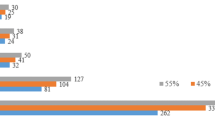Abstract
It has traditionally been argued that recycling municipal solid waste (MSW) is usually not economically viable and that only when externalities, long-term dynamic considerations, and/or the entire product life cycle are taken into account, recycling becomes worthwhile from a social point of view. This article explores the results of a wide study conducted in Israel in the years 2000–2004. Our results reveal that recycling is optimal more often than usually claimed, even when externality considerations are ignored.
The study is unique in the tools it uses to explore the efficiency of recycling: a computer-based simulation applied to an extensive database. We developed a simulation for assessing the costs of handling and treating MSW under different waste-management systems and used this simulation to explore possible cost reductions obtained by designating some of the waste (otherwise sent to landfill) to recycling. We ran the simulation on data from 79 municipalities in Israel that produce over 60% of MSW in Israel. For each municipality, we were able to arrive at an optimal method of waste management and compare the costs associated with 100% landfilling to the costs born by the municipality when some of the waste is recycled. Our results indicate that for 51% of the municipalities, it would be efficient to adopt recycling, even without accounting for externality costs. We found that by adopting recycling, municipalities would be able to reduce direct costs by an average of 11%.
Through interviews conducted with representatives of municipalities, we were also able to identify obstacles to the utilization of recycling, answering in part the question of why actual recycling levels in Israel are lower than our model predicts they should be.




Similar content being viewed by others
References
Ackerman F (1997) Why do we recycle? Markets, values and public policy. Island Press, Washington, DC
Ackerman F, Gallagher K (2002) Mixed signals: market incentives, recycling, and the price spike of 1995. Resources, Conservation and Recycling, 35:275–295
Ayalon O, Avnimelech Y, Shechter M (1999) Issues in designing an effective solid waste policy: The Israeli experience. in Sterner T (ed.), The market and the environment: The effectiveness of market based instruments for environmental reform. Edward Elgar Publishing, Cheltenham, UK, Pages 389–406
Biotech Environmental Company Ltd. (1995) National waste composition survey: A report submitted to the Israeli Ministry of Environmental Protection. Biotech Environmental Co. (in Hebrew)
Brisson IE (1997) Assessing the waste hierarchy: A social cost-benefit analysis of municipal solid waste management in the European Union. Samfund, Okonomi and Miljo, 19. AKF Forlaget, Kopenhagen
Callan SJ, Thomas JM (2001) Economies of scale and scope: A cost analysis of municipal solid waste services. Land Economics 77(4):548–560
Collins A, O’Doherty R, Snell MC (2006) Household participation in waste recycling: Some national survey evidence from Scotland. Journal of Environmental Planning and Management 49(1):121–140
Dijkgraaf E, Gradus R (2003) Cost savings of contracting out refuse collection. Empirica, Journal of Applied Economics and Economic Policy 30(2):149–161
Dobos I, Richter K (2003) A production/recycling model with stationary demand and return rates. Central European Journal of Operations Research 11(1):35–46
Eichner T, Pethig R (2001) Product design and efficient management of recycling and waste treatment. Journal of Environmental Economics and Management 41:109–134
Fullerton D, Kinnaman T (1996) Household responses to pricing garbage by the bag. American Economic Review 86:971–984
Folz DH (1999) Municipal recycling performance: A public sector environmental success story. Public Administration Review 59(4):336–345
Folz DH (2004) Service quality and benchmarking the performance of municipal services. Public Administration Review 64(2):209–220
Harder MK, Woodard R, Bench ML (2006) Two measured parameters correlated to participation rates in curbside recycling schemes in the U.K. Environmental Management 37(4):487–495
Highfill J, McAsey M (1997) Municipal waste management: Recycling and landfill space constraints. Journal of Urban Economics 41:118–136
Hong S, Adams R (1999) Household responses to price incentives for recycling: some further evidence. Land Economics 75(4):505–514
Huhtala A (1997) A post consumer waste management model for determining optimal levels of recycling and landfill. Environmental Resource Economics 10:301–314
Jenkins R (1993) The economics of solid waste reduction: The impact of user fees. Edward Elgar Publishing, Cheltenham, UK
Jenkins R, Martinez S, Palmer K, Podolsky M (2003) The determinants of household recycling: A material-specific analysis of recycling program features and unit pricing. Journal of Environmental Economics and Management 45(3):294–318
Kohn R (1995) Convex combinations of recycling incentives. Mathematical Computation Modelling 21:13–21
Lavee Economic Consulting. (2000) Economic valuation of recycling in municipalities in Israel, report submitted to the Israeli Ministry of Environment. Lavee Economic Consulting, 71 Ashkenzai St., Tel-Aviv (in Hebrew)
Miranda M, Everett J, Blume D, Barbeau R (1994) Market based incentives and residential municipal solid waste. Journal of Policy Analysis and Management 13(4):681–698
Morris J (1993) The economics of recycling and recycled materials. Sound Resource Management Group, Clean Washington Center, Seattle, WA
Palmer K, Walls M (1997) Optimal policies for solid waste disposal taxes, subsidies, and standards. Journal of Public Economics 65:193–205
Palatnik R, Ayalon O, Shechter M (2005) Household demand for waste recycling services. Environmental Management 35(2):121–129
Peretz JH, Tonn BE, Folz DH (2005) Explaining the performance of mature municipal solid waste recycling programs. Journal of Environmental Planning and Management 48(15):627–650
Ready M, Ready R (1995) Optimal pricing of depletable, replaceable resources: The case of landfill tipping fees. Journal of Environmental Economics and Management 28(3):307–323
Sigman H (1995) A comparison of public policies for lead recycling. RAND Journal of Economics 26(3):452–478
Staudt E (1993) A comparison of the cost structure and fees for domestic waste disposal and recycling (abridged version). Ruhr Universitat, Bochum, Germany
Teixeira J, Antunes AP, Sousa JP (2004) Recyclable waste collection planning: A case study. European Journal of Operational Research 158:543–554
Van-Houtven G, Morris G (1999) Household behavior under alternative pay-as-you-throw systems for solid waste disposal. Land Economics 75(4):515–537
Acknowledgments
The author wishes to express his gratitude to the Ministry of Environmental Protection, which financed this research, and to Prof. Uri Regev, Prof. Nir Becker, Prof. Frank Ackerman, and four anonymous referees for their helpful comments and suggestions.
Author information
Authors and Affiliations
Corresponding author
Appendix form for Data on Waste Treatment
Appendix form for Data on Waste Treatment
10. Other Current Costs/Savings
10d. One-time costs of transition to recycling
-
1.
Cost of information campaign – budget allocation for transition to recycling, including type of actions and budget.
-
2.
Organization costs—one-time cost of organizing.
Rights and permissions
About this article
Cite this article
Lavee, D. Is Municipal Solid Waste Recycling Economically Efficient?. Environmental Management 40, 926–943 (2007). https://doi.org/10.1007/s00267-007-9000-7
Received:
Accepted:
Published:
Issue Date:
DOI: https://doi.org/10.1007/s00267-007-9000-7




